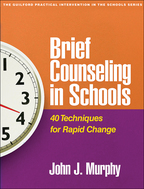Brief Counseling in Schools
40 Techniques for Rapid Change
John J. Murphy
HardcoverPaperbacke-bookprint + e-book
Hardcover
pre-orderApril 7, 2026
ISBN 9781462562336
Price: $60.00 191 Pages
Size: 8" x 10.5"
Paperback
pre-orderApril 1, 2026
ISBN 9781462562329
Price: $40.00191 Pages
Size: 8" x 10.5"
e-book
pre-orderApril 1, 2026
PDF and Accessible ePub ?
Price: $40.00 191 Pages
ePub is Global Certified Accessible
print + e-book $80.00 $48.00
pre-orderPaperback + e-Book (PDF and Accessible ePub) ?
Price: 191 Pages
ePub is Global Certified Accessible
With child and adolescent mental health problems on the rise, this timely book offers school practitioners a practical blueprint and 40 effective techniques for supporting meaningful change as quickly as possible. Brief counseling expert John J. Murphy provides evidence-based, culturally responsive tools for helping PreK–12 students resolve frequently encountered psychological and behavioral challenges. The book presents streamlined strategies that can be applied by practitioners of any theoretical orientation to build alliances, set goals, leverage resources, change problem patterns, and empower progress. In a convenient large-size format, the book includes vivid case examples and dialogues, sample scripts, reflection questions, learning activities, and reproducible/downloadable forms for use with students, parents, and teachers.
This title is part of The Guilford Practical Intervention in the Schools Series, edited by Sandra M. Chafouleas.
“Read today, use tomorrow! This essential guide equips school mental health professionals with effective, culturally responsive interventions they can apply immediately. Brief therapy empowers students to build on what works, promoting rapid, lasting improvement across a wide range of mental health challenges. The 40 counseling techniques in this book are accessible and easy to implement. This is a 'must-have' resource for school psychologists, counselors, and social workers ready to move from deficit-focused to strengths-based practice.”
—Andria Amador, EdD, NCSP, Senior Director of Behavioral Health Services, Boston Public Schools
“Murphy has delivered a practical, engaging, and highly usable text that deserves a place on the shelf of every school mental health professional and trainer. I recommend it for graduate courses, as well as for practitioners seeking to refresh their skills. The book seamlessly blends theory with application, offering strategies and scripts that can be applied immediately. It is rare to find a book that speaks so directly to both training and practice—Murphy has achieved exactly that. I will definitely use this text in my courses to support critical skill development. Students will benefit from its clarity, real-world grounding, and attention to the unique context of school-based work. ”
—Jessica S. Reinhardt, PhD, NCSP, Professor of Practice and School Psychology Program Coordinator, Temple University; 2026 President-Elect, APA Division 16 (School Psychology)
“A vital resource for school-based practitioners facing the escalating demand for mental health services. What makes this book special is its collaborative, strengths-based, student-centered, and culturally responsive approach. The real-world examples and discussion prompts, which are a natural part of Murphy’s training style, make this an excellent resource for supervision, as well as for counseling and practical intervention courses. Murphy provides efficient, adaptable, evidence-based strategies for individual counseling, parent and teacher consultation, and schoolwide programs. This book empowers professionals to effectively serve more students and significantly bridge the treatment gap.”
—Ray W. Christner, PsyD, NCSP, ABPP, private practice, Hanover, Pennsylvania
“Schools are in crisis all over the world. The conventional solutions for students' behavioral problems—punishments and consequences—do not work. It’s time to think outside the box. It's time to take to heart what experienced practitioners like Murphy tell us about brief strategies, such as solution-focused therapy, which not only help to solve problems more effectively, but also support healthy learning environments.”
—Ben Furman, MD, psychiatrist, psychotherapist, and teacher of solution-focused therapy, Finland; developer of the Kids' Skills method
Table of Contents
1. Introduction
2. Foundations of Brief Counseling in Schools
3. Techniques for Building Alliances
4. Techniques for Setting Goals
5. Techniques for Leveraging Resources
6. Techniques for Changing Problem Patterns
7. Techniques for Empowering Progress
8. Other Uses of Brief Counseling Techniques
Closing Comments
References
Index
